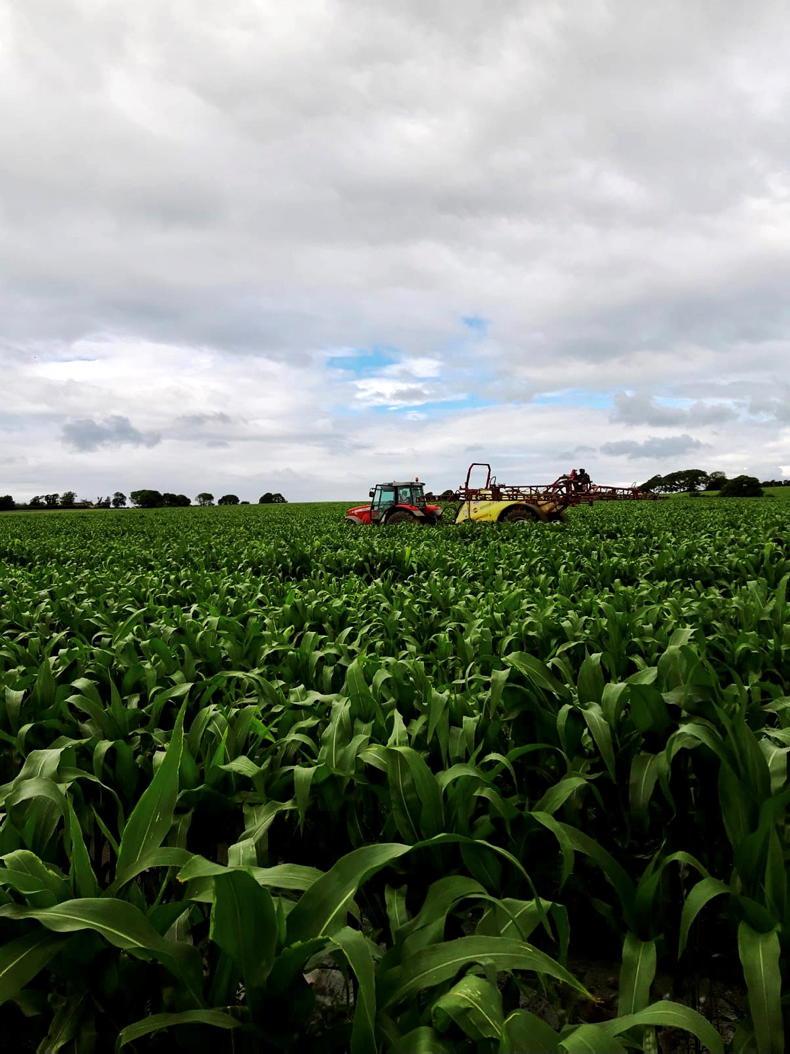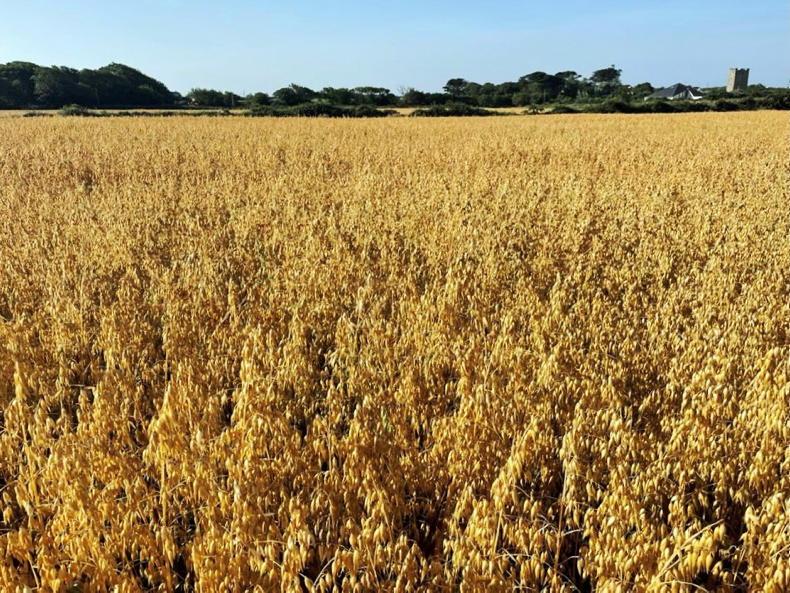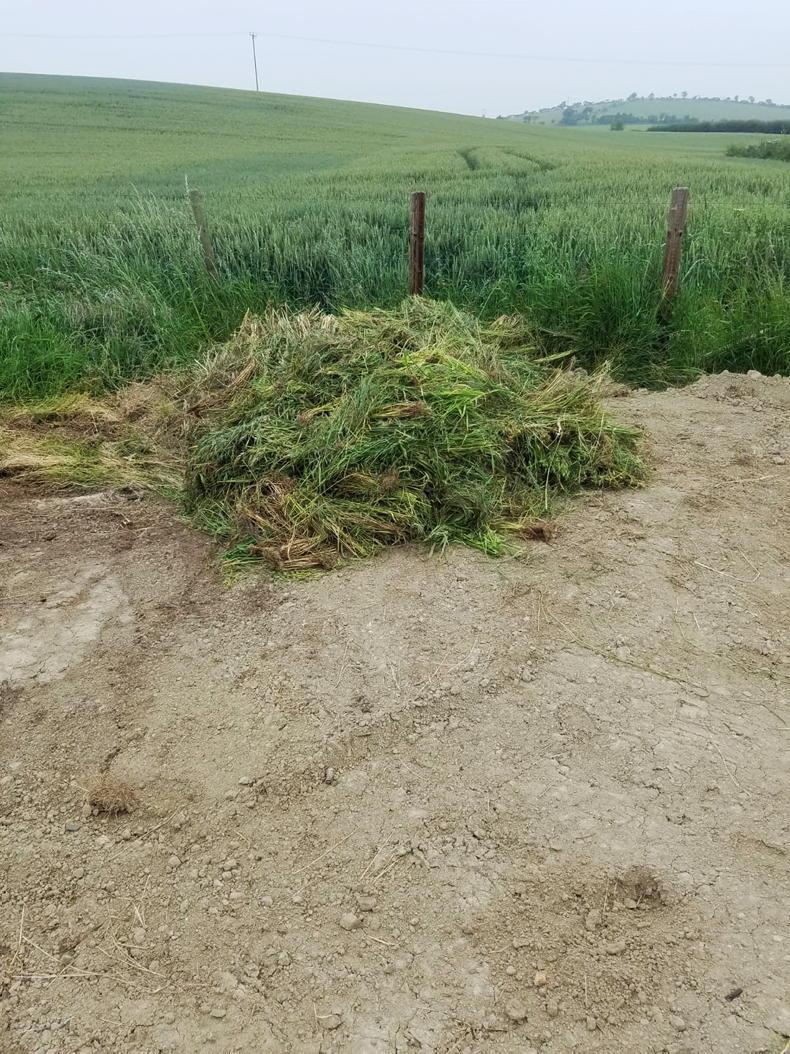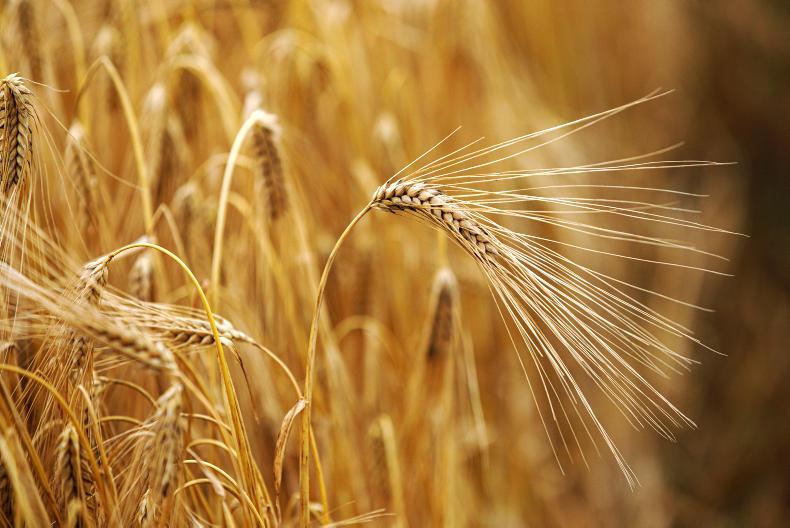Con Barry,
Lixnaw,
Co Kerry

Con applying trace elements onto his maize crops.
The weather has been fantastic in Kerry over the past week, with temperatures reaching well above 27°C, explains Con. Crops and grass are developing well and with over 78mm of rainfall throughout the past month, moisture isn’t an issue.
Con sprayed trace elements on to his maize crops last week. The crops are doing very well, but anywhere the plastic was blown off is poor.
He thinks the cold nights in May were hard on the uncovered crop, severely limiting its potential. He applied a combination of YaraVita Maize Boost (1l/ha), EPSO Combitop (2kg/ha), as well as magnesium sulfate (1kg/ha).
His winter wheat crops are also looking quite good, although some chickweed has appeared in parts of the field. He thinks the crop will be ready for crimping at the start of August.
Con has decided to crimp his winter hybrid rye, which will be ready by early next week. The leaves on the crop have now died, but the stems remain green.
He notes that while there are a high number of grains on the head, the grains are very small so he is unsure how it will yield.
Since talking to Con last, he has finished all treatments on his spring crops. His spring wheat crops head spray consisted of Jade (1l/ha), Ascra Xpro (0.2l/ha), Globaztar (0.4l/ha), as well as EPSO Combitop (2kg/ha). The crop will be wholecropped in a few weeks.
His spring oat crops are still green and standing well, with very few blank grains. Despite receiving just one PGR, the heavy rain towards the start of the month didn’t lodge it. He applied Elatus Era (0.8l/ha) and Globaztar (0.4l/ha) as a head spray and the crop remains disease-free.
Finally, his spring barley crops are looking good and received a head spray of Decoy and Coment, as well as EPSO Combitop. Similar to winter wheat, a small amount of chickweed has appeared in the crop, but remains manageable.
Padraig Kehoe,
Enniscorthy,
Co Wexford

Some of Padraig's winter oats will be ready for harvest by the weekend.
The weather over the past week has been exceptionally good in Enniscorthy, explains Padraig. The winter barley harvest is in full swing in his area, with many growers nearly finished.
“The week of hot weather has really brought crops in much quicker than expected,” he said. Padraig has been busy getting ready for his own harvest, which should commence by the weekend. He doesn’t have winter barley this year and instead will start with winter oats.
He recently rogued his seed winter wheat crops, as well as his gluten-free winter oats, which subsequently passed. He thinks the gluten-free oats won’t be ready for another week, however.
He is surprised at how long the grain-filling period is taking for his hybrid winter rye. The long, thin grains still have considerable filling to do before harvest. The leaves have now died off, but the stems remain green. All of the crop is still standing, but he did note some lodging in spring barley and winter wheat.
Crows are becoming a problem in some of his winter crops, particularly where crops have lodged. Padraig has set up a banger to deter them.
Disease pressure
He has noted that a significant amount of septoria has crept into his winter wheat crops over the past few weeks, with just the flag leaf remaining clean. Padraig says there was always pressure on the crop, initially beginning low down in the canopy before making its way up. The rainfall towards the start of the month really accelerated the disease’s development, he explains. He is not overly concerned however, and thinks the crop has reasonably good potential this year.
His spring barley crops have recovered well after a difficult start, but in general, Padraig describes them as a mixed bag. Grain fill appears to be coming along well however, and they remain very clean.
Finally, his spring bean crops are looking very good. “The beans are looking as good as they have ever been,” Padraig comments. The rain earlier this month has really helped them.
Iain McMordie,
Downpatrick,
Co Down

Iain spent four days in one 20ac field pulling sterile brome.
Records were broken in Co Down last week, as temperatures reached 31.2°C. Thankfully for Iain, temperatures remained at a more manageable 26°C on his farm thanks to the sea breeze.
Conditions are extremely dry in Down. Over the past 30 days, just half a millimetre of rain has fallen. The hot and dry weather is now really adding to the moisture pressure. Iain explains that many potato farmers are irrigating their crops, grass growth has slowed considerably and cereals on lighter soils are now burning up. Crops growing on heavier land are holding up ok, however.
Iain’s harvest is likely to commence at the end of the week. His hybrid varieties will be ready first and are looking quite good. Next, he intends to move on to winter oilseed rape.
He hasn’t desiccated the crop in over three years, as he thinks the pod-shatter tolerance of modern varieties buys enough time to let it die naturally. That said, he is considering it for crops headlands this year.
His winter wheat crops are still at least four weeks from harvest, he thinks, but crops on lighter ground are beginning to turn quicker.
Spring crops
Most of Iain’s spring oats are still green, but plants on light ground are quickly dying due to drought. He has both seed crops and milling crops this year. His spring beans are holding up ok despite the lack of moisture. This is his third year growing the crop and thinks they have reasonable potential, as the number of plants/m2 are very high.
Iain has a zero-tolerance approach to grassweeds, particularly bromes and wild oats. That means much of this time of year is spent hand-rouging crops. In total, he has spent 10 full days rouging grassweeds, but this is necessary before harvest, he explains.
Elsewhere, he is nearly finished working on a newly built grain store. This week he was erecting panel walls to create bays for different crops in the shed.

Con Barry,
Lixnaw,
Co Kerry

Con applying trace elements onto his maize crops.
The weather has been fantastic in Kerry over the past week, with temperatures reaching well above 27°C, explains Con. Crops and grass are developing well and with over 78mm of rainfall throughout the past month, moisture isn’t an issue.
Con sprayed trace elements on to his maize crops last week. The crops are doing very well, but anywhere the plastic was blown off is poor.
He thinks the cold nights in May were hard on the uncovered crop, severely limiting its potential. He applied a combination of YaraVita Maize Boost (1l/ha), EPSO Combitop (2kg/ha), as well as magnesium sulfate (1kg/ha).
His winter wheat crops are also looking quite good, although some chickweed has appeared in parts of the field. He thinks the crop will be ready for crimping at the start of August.
Con has decided to crimp his winter hybrid rye, which will be ready by early next week. The leaves on the crop have now died, but the stems remain green.
He notes that while there are a high number of grains on the head, the grains are very small so he is unsure how it will yield.
Since talking to Con last, he has finished all treatments on his spring crops. His spring wheat crops head spray consisted of Jade (1l/ha), Ascra Xpro (0.2l/ha), Globaztar (0.4l/ha), as well as EPSO Combitop (2kg/ha). The crop will be wholecropped in a few weeks.
His spring oat crops are still green and standing well, with very few blank grains. Despite receiving just one PGR, the heavy rain towards the start of the month didn’t lodge it. He applied Elatus Era (0.8l/ha) and Globaztar (0.4l/ha) as a head spray and the crop remains disease-free.
Finally, his spring barley crops are looking good and received a head spray of Decoy and Coment, as well as EPSO Combitop. Similar to winter wheat, a small amount of chickweed has appeared in the crop, but remains manageable.
Padraig Kehoe,
Enniscorthy,
Co Wexford

Some of Padraig's winter oats will be ready for harvest by the weekend.
The weather over the past week has been exceptionally good in Enniscorthy, explains Padraig. The winter barley harvest is in full swing in his area, with many growers nearly finished.
“The week of hot weather has really brought crops in much quicker than expected,” he said. Padraig has been busy getting ready for his own harvest, which should commence by the weekend. He doesn’t have winter barley this year and instead will start with winter oats.
He recently rogued his seed winter wheat crops, as well as his gluten-free winter oats, which subsequently passed. He thinks the gluten-free oats won’t be ready for another week, however.
He is surprised at how long the grain-filling period is taking for his hybrid winter rye. The long, thin grains still have considerable filling to do before harvest. The leaves have now died off, but the stems remain green. All of the crop is still standing, but he did note some lodging in spring barley and winter wheat.
Crows are becoming a problem in some of his winter crops, particularly where crops have lodged. Padraig has set up a banger to deter them.
Disease pressure
He has noted that a significant amount of septoria has crept into his winter wheat crops over the past few weeks, with just the flag leaf remaining clean. Padraig says there was always pressure on the crop, initially beginning low down in the canopy before making its way up. The rainfall towards the start of the month really accelerated the disease’s development, he explains. He is not overly concerned however, and thinks the crop has reasonably good potential this year.
His spring barley crops have recovered well after a difficult start, but in general, Padraig describes them as a mixed bag. Grain fill appears to be coming along well however, and they remain very clean.
Finally, his spring bean crops are looking very good. “The beans are looking as good as they have ever been,” Padraig comments. The rain earlier this month has really helped them.
Iain McMordie,
Downpatrick,
Co Down

Iain spent four days in one 20ac field pulling sterile brome.
Records were broken in Co Down last week, as temperatures reached 31.2°C. Thankfully for Iain, temperatures remained at a more manageable 26°C on his farm thanks to the sea breeze.
Conditions are extremely dry in Down. Over the past 30 days, just half a millimetre of rain has fallen. The hot and dry weather is now really adding to the moisture pressure. Iain explains that many potato farmers are irrigating their crops, grass growth has slowed considerably and cereals on lighter soils are now burning up. Crops growing on heavier land are holding up ok, however.
Iain’s harvest is likely to commence at the end of the week. His hybrid varieties will be ready first and are looking quite good. Next, he intends to move on to winter oilseed rape.
He hasn’t desiccated the crop in over three years, as he thinks the pod-shatter tolerance of modern varieties buys enough time to let it die naturally. That said, he is considering it for crops headlands this year.
His winter wheat crops are still at least four weeks from harvest, he thinks, but crops on lighter ground are beginning to turn quicker.
Spring crops
Most of Iain’s spring oats are still green, but plants on light ground are quickly dying due to drought. He has both seed crops and milling crops this year. His spring beans are holding up ok despite the lack of moisture. This is his third year growing the crop and thinks they have reasonable potential, as the number of plants/m2 are very high.
Iain has a zero-tolerance approach to grassweeds, particularly bromes and wild oats. That means much of this time of year is spent hand-rouging crops. In total, he has spent 10 full days rouging grassweeds, but this is necessary before harvest, he explains.
Elsewhere, he is nearly finished working on a newly built grain store. This week he was erecting panel walls to create bays for different crops in the shed.











 This is a subscriber-only article
This is a subscriber-only article










SHARING OPTIONS: